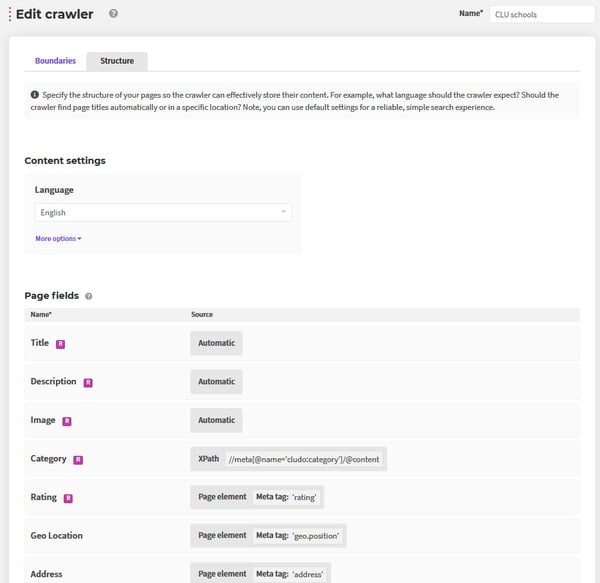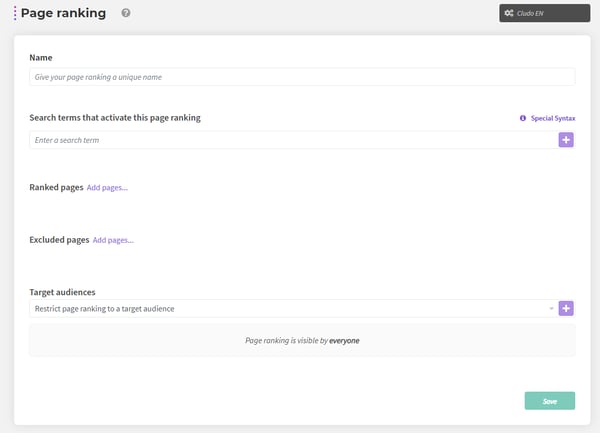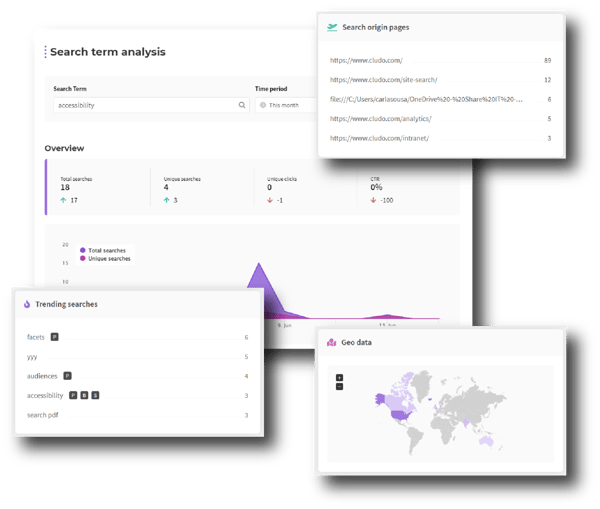Hybrid Search: The Best of Both Worlds Search Solution
Cludo’s new Hybrid Search combines keyword precision with vector intelligence to deliver smarter, more relevant, and context-aware search results.
An in-depth comparison between Google's Programmable Search and Cludo's Site Search platform. Compare the setup, implementation, analytics and more.
Choosing the right site search solution can significantly impact user experience, engagement, and conversions. While Google’s Programmable Search Engine (formerly Google Custom Search) offers a familiar, free solution, Cludo provides an advanced, AI-powered alternative that enhances control, insights, and customization.
In this comparison, we break down the key differences to help you decide which search solution best fits your needs.
Both Google PSE and Cludo make it easy to add multiple domains, or websites, to be crawled.
All update or delete requests must be submitted through Google Search Console and also reflects what Google displays in their search engine. Google determines when content is indexed and doesn’t provide much visibility as to when, so if you’re consistently adding new content or updating it, finger’s crossed, Google updates it in time for your search!
With Cludo, you can have your index crawled daily, or even hourly using a smart crawling. If you delete, update, or add a page, you can use our Update Content tool to have it updated in your index on demand.
Google relies on structured data or schema’s in order to setup custom filtering or refinements, which are categories for Cludo. The same goes for any scoping for searches. In the same terms, structuring your data also affects how your website will be indexed in Google’s search engine.
Google determines the default title and description for pages, whereas, with Cludo, you can choose how those details are extracted from the pages using a variety of methods, including meta tags, URL matches, or XPath. For images, Google will choose the image used, whereas you can define what images are pulled for the search results.

Google and Cludo both provide templates to use out of the box, including in-line and overlay options.
You can implement Google using the standard templates or go the developer route and build it yourself through their API. Either route would require heavy development resources.
In addition to the standard templates, Cludo offers professional services for implementation. Pay a one time fee to have Cludo build out the search results page to your liking! If you want to go the developer route, Cludo also offers an API.
At Cludo, we’ve developed our templates to meet web accessibility standards. Cludo’s standard templates are WCAG 2.2 compliant, and our custom implementations go through accessibility testing to meet these standards as well.
Unfortunately, there are a few accessibility issues with Google’s PSE implementation. Some of these issues include images missing alternative text, making it hard for screen readers to know what the purpose or description of the image is. When looking at accessibility, most organizations are required to meet WCAG 2.1 Level A and AA to be compliant and you’ll have to Google a workaround if looking to use Google PSE or go the API route.
Even when things are “free”, there is always some sort of cost that comes along with it. For Google, free site search means having paid ads on your search, that may link to other websites, potentially your competitors.
Unlike Google, Cludo is completely ad-free, ensuring a seamless and distraction-free search experience. Cludo doesn’t include ads, but we do offer tools that allow you to promote your own content in your site search. On average, 43% of website visitors will use your site search. By leveraging our Banners tool, you can get relevant content in front of your visitors to further move them through your marketing funnel.
Google offers a straightforward search solution with some degree of customization. However, it comes with limitations, such as the presence of ads in search results unless a paid version is used. Customization options are relatively limited, making it challenging for businesses to fully control how their search results are ranked and displayed.
On the other hand, Cludo’s search engine provides a highly customizable experience. It allows organizations to tailor search results, filters, and relevance controls to better align with visitor intent. This level of control ensures that search results are always relevant, improving the overall user experience and making information more accessible. Additionally, Cludo gives full control over custom design and branding options, allowing organizations to seamlessly integrate search functionality into their websites without compromising their visual identity.
Why is control of your search important? The cost associated to having an ineffective site search engine can be expensive. Consider the amount of ad dollars and resources you create to get your visitors to actually visit your website. Your visitors search to learn more about your product and offerings and due to one misspelling or wrong synonym, they don’t get any results within the search. Now what? 80% of your website visitors will leave your website if they perceive the search quality or relevance to be poor. As much as the out-of-the-box algorithm should work, control of the search engine allows you to influence the search experience, for the better.
Your search should be controlled by two different types of method – the frequency of indexing to ensure content is up to date for your results, and the relevancy of the engine itself. This includes the weight of the specific type of results in your search results (new articles higher than older), promoted content in search (think Ads but for your own content), and granular control (when someone searches this, make these results appear first).
Google is limited with control and you’re at the mercy of its algorithm. There are a few tools, such as their promotions, that allow you to choose specific rankings for a search word, refinements, which can impact the weight of specific results within categories. Even with these tools, as a non-developer, utilizing these tools was a little tricky and required a lot of extra Googling.
With Cludo, you don’t need to be a developer to control what results appears in your search. With many marketing professionals taking the reigns of the website, it’s more important than ever to ensure your website is delivering content no matter how visitors’ are trying to find it.
Using page rankings, you can easily specify a ranking for specific keywords. Want to promote campus tours, or where to see your tax return status? Setup a banner and enter that information directly in the search for the relevant search results. You can also easily boost results for your high converting sections of the website, such as the Admissions section.

And when you’re not completely sure, let Cludo’s AI-powered page rankings do the work and dynamically rank pages based on your visitors behavior with the website and search over time. Cludo’s machine learning software inspects user search activity to identify patterns of behavior, and then adjusts the ranking of search results for every query to deliver the most relevant information.
Marketing professionals rely on data to measure the success of the website experience. Site search is one of the few methods that can actually provide you with specific information your visitors are looking for and can help move down the funnel.
Within the Google PSE interface, the type of analytics reporting you get is limited. You get an overview of what people are looking for on your website, but it doesn’t help you answer the important questions you need to answer with the data, such as:
Are visitors visitors finding what they need to?
Are they searching with a specific purpose or out of frustration?
Is your search engine failing due to lack of content on your website?
Your best bet is to configure the account with your Google Analytics account to see more reports, which may require more setup and still not lack in usability and visibility of that data.
Whether or not you’re using Google Analytics, you can find all search related data directly in your MyCludo dashboard, along with tools to control the search on the fly. Using Google Analytics as your main source of website data? No problem. You can send Cludo’s data directly into your Google Analytics account to get a full picture of your website.

To put it plain and simple, if you want help with Google’s Programmable Search, you’ll have to Google it. There’s no team waiting to assist you with getting set up, customize, or even adjust your algorithm. Implementing Google’s PSE is relatively simple, requiring only basic embed options. However, direct support is limited, with most help available only through documentation and online forums.
Cludo offers unlimited phone and email support across an office in the US and the EU. No question is too silly or dumb to ask when it comes to ensuring your visitors have a great search experience on your website. Every customer with Cludo is also paired with a Customer Success Manager to ensure you’re getting the most out of the site search solution.
Google’s Programmable Search is free, but ads are displayed unless users opt for a paid version. The cost structure varies based on usage and customization needs, potentially leading to additional expenses for businesses that require more control.
Cludo operates on a subscription-based model, with pricing tailored to different needs and traffic volumes. This approach includes access to premium features, customer support, and AI-driven search enhancements, ensuring a higher level of service and performance.
At the end of the day, both Google and Cludo do the same thing – they provide internal site search. However, it’d be naive to compare the two solutions as apples to apples.
Google provides a site search that works if you have a development background and the time and resources to maintain it. If you want something to “set and forget”, Google’s price tag can be pretty desirable, but, you’ll need to factor in the cost of the time for a developer to implement it, the time to Google the right answers when they get stumped, a lot of trial and error, limited control, and analytics.
Cludo’s site search provides a site search that not only works, but gives you visibility and insight into what your website visitors want through powerful search analytics and control of your search experience, using tools to optimize your website content even further. With multiple methods for implementation, whether you’re a developer or marketer, you can have site search up and running on your website in no time. And if that’s not the case, you won’t have to waste hours Googling the answer – simply connect with our global Customer Experience team.
Have questions about the pros and cons? Connect with us today to learn how Cludo can help fulfill your site search needs or important factors to consider when looking at a new site search solution.
Cludo’s new Hybrid Search combines keyword precision with vector intelligence to deliver smarter, more relevant, and context-aware search results.
Cludo’s SaaS search alternative to Google Search Appliance is a powerful, best-in-class enterprise search and insights platform.
Migrating from the Google Search Appliance? This handy guide will help you select and create a smooth transition to your new site search platform.
Be the first to know about the world of search and analytics.